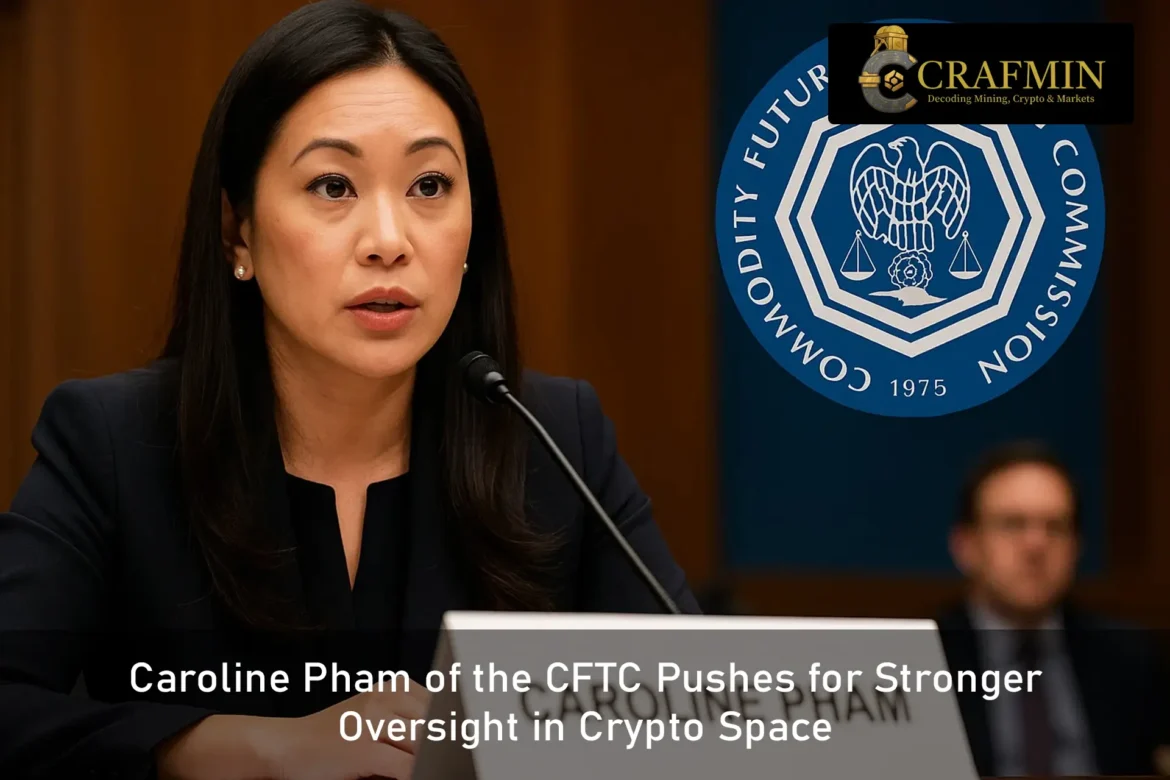In an era where digital assets are under the microscope, Caroline Pham, a leading Commissioner at the U.S. Commodity Futures Trading Commission (CFTC), has sent a powerful message: the crypto industry is no longer operating in a regulatory grey zone.
With her latest statements, Pham has made her position abundantly clear—blockchain developers, decentralised finance (DeFi) platforms, and token-based projects must prepare for a more rigorous compliance regime under existing financial regulations.

Image of Caroline Pham ( Source: CoinDesk )
A Shift Toward Clarity Over Chaos
The digital asset industry has long operated amid a lack of clear legal guidance. According to Pham, that ends now. She is advocating for a regulatory system that is both predictable and transparent—one that safeguards innovation but enforces accountability.
“We need clarity, not confusion,” Pham stated. In her view, regulatory ambiguity has opened the door for bad actors while leaving law-abiding firms unsure of their obligations. Her stance reflects a broader movement in U.S. financial governance toward precision, rule-based oversight, and long-term stability in the crypto space.
Why Her Position Carries New Weight
What makes Pham’s message especially compelling is its timing. The digital asset sector is already dealing with intensified scrutiny—ongoing enforcement actions from the SEC, growing constraints around stablecoins, and legal pressure on offshore crypto exchanges.
But unlike some regulators who prioritise enforcement over engagement, Pham is charting a middle course. Rather than opting for sweeping punitive measures, she is focused on structured oversight—particularly in the derivatives market, an area where the CFTC’s jurisdiction is strongest.
This targeted strategy allows the CFTC to step into a leadership role where other agencies may overstep or underreach.
Financial Expertise Meets Emerging Technology
Caroline Pham’s views are shaped by a robust background in derivatives, capital markets, and institutional finance. Her hands-on experience in these areas gives her a unique lens through which she views digital assets—not as an outsider but as someone who understands the mechanics of complex financial systems.
She’s particularly focused on whether crypto companies are adhering to existing obligations under the Commodity Exchange Act. Those who fall short of compliance should expect consequences. However, Pham isn’t advocating for an all-out crackdown. Instead, her approach seeks to integrate blockchain innovation within a legally sound framework—ensuring it matures alongside traditional finance, not outside it.
Why the Stakes Are Higher Than Ever
Should Caroline Pham and aligned regulators prevail, the United States could reclaim its position as a global frontrunner in regulating digital assets. But the road ahead is fragile. Without coherent, collaborative, and globally aligned policies, crypto firms may continue migrating to more favourable regulatory environments like Switzerland, Singapore, or the UAE.
Pham has underscored the necessity of international coordination and the modernization of the CFTC’s regulatory approach. She envisions a future where U.S. oversight strengthens trust in the system rather than disrupts innovation. Her stance aims to build bridges—not walls—between regulators and crypto innovators.
CFTC Acting Chair Caroline Pham said the agency will maintain strict oversight of the crypto industry despite support from the Trump administration.
She emphasised that fraud and theft will not be tolerated, and noted that the CFTC has ended its “regulation by enforcement”…
— LondonCryptoClub (@LDNCryptoClub) June 13, 2025
Real Impacts: What Builders and Traders Should Expect
Pham’s regulatory signals are already influencing how blockchain companies operate. Developers, investors, and decentralised exchanges are all paying close attention—and many are beginning to reassess their compliance risk in light of her comments.
Stricter CFTC enforcement could lead to:
- Strengthened Know Your Customer (KYC) measures for DeFi platforms.
- More rigorous data reporting requirements for digital derivatives.
- Legal exposure for decentralised platforms that list commodity-linked tokens without proper registration.
Her push implies a future where technical innovation alone isn’t enough—regulatory compliance becomes an equal part of the success equation.
Also Read: Binance Expands to Syria as U.S. Lifts Sanctions
A Crucial Juncture for U.S. Blockchain Strategy
Pham’s remarks highlight a pressing dilemma: Can the United States successfully regulate digital assets without stifling innovation?
Getting it right will demand coordination across agencies, clearer rules, and a consistent message to the market. Failure to do so could fragment the industry further and push key players overseas.
Yet in Pham’s proposals lies a potential turning point—a rare moment where effective regulation could restore public trust, enable long-term growth, and give the U.S. a renewed edge in digital financial innovation.
Final Thoughts: The Time for Regulatory Maturity Has Come
Caroline Pham’s message isn’t about prohibition—it’s about structure and order. In an industry often known for volatility, her approach brings a necessary focus on rules, integrity, and sustainable growth.
Crypto leaders should not underestimate the weight of her words. As the CFTC prepares to adopt a tougher approach—especially in enforcing derivatives rules—Pham is urging the industry to adapt. Her directive is clear:
“Bring your operations into compliance—or prepare to face serious regulatory consequences.”

